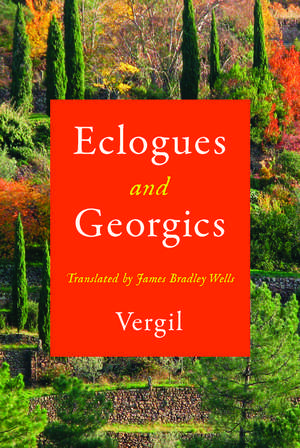Eclogues and Georgics
Autor Vergil Traducere de James Bradley Wellsen Limba Engleză Hardback – 14 sep 2022
The accompanying introductory essays situate Vergil’s poems in a rich literary tradition. Wells provides historical context and literary analysis of these two works, eschewing facile interpretations of these oft examined texts and ensconcing them in the society and culture from which they originated. These annotated essays, a pronunciation guide, and a glossary, alongside Wells’s bold vision for what translation choices can reveal, guide readers as they explore this ancient and famously difficult poetry.
Preț: 174.23 lei
Nou
Puncte Express: 261
Preț estimativ în valută:
33.34€ • 36.21$ • 28.01£
33.34€ • 36.21$ • 28.01£
Carte disponibilă
Livrare economică 01-15 aprilie
Preluare comenzi: 021 569.72.76
Specificații
ISBN-13: 9780299337407
ISBN-10: 0299337405
Pagini: 248
Ilustrații: 0 illus.
Dimensiuni: 152 x 229 x 20 mm
Greutate: 0.5 kg
Ediția:First Edition
Editura: University of Wisconsin Press
Colecția University of Wisconsin Press
ISBN-10: 0299337405
Pagini: 248
Ilustrații: 0 illus.
Dimensiuni: 152 x 229 x 20 mm
Greutate: 0.5 kg
Ediția:First Edition
Editura: University of Wisconsin Press
Colecția University of Wisconsin Press
Recenzii
“That Wells comes at Vergil from two angles of approach—that of classics scholar and that of a poet in his own right—makes him perhaps uniquely qualified to deliver us these exciting new translations of Eclogues and Georgics. The triumph here is that Wells brilliantly grafts elements of English prosody onto Vergil's original, enriching the work without obscuring its original cultural context. Indeed, Wells's innovative application of Hopkins-esque sprung-rhythm and compounds—hawkshriek, ironrust, doombent—enlivens the text, helping Vergil's work take on new resonance and urgency in English. As a piece of translation and a piece of poetry, Wells's innovation is refreshing and his achievement is tremendous.”—Iain Haley Pollock, winner of the Cave Canem Poetry Prize and author of Ghost, like a Place
“Of all the great poems of the Latin tradition, Vergil’s Eclogues and Georgics are notoriously the most elusive of fine translation. The poetic strength of Wells’s fine new versions derives from a precise yet flexible English line and a rendering of Vergil’s language that is as clear eyed and unsentimental as any we are likely to encounter.”—William Levitan, Grand Valley State University
“Erudite, informative, insightful, thought-provoking, and superbly translated. . . . A significant and unreservedly recommended addition.”—Midwest Book Review
“Of all the great poems of the Latin tradition, Vergil’s Eclogues and Georgics are notoriously the most elusive of fine translation. The poetic strength of Wells’s fine new versions derives from a precise yet flexible English line and a rendering of Vergil’s language that is as clear eyed and unsentimental as any we are likely to encounter.”—William Levitan, Grand Valley State University
“Erudite, informative, insightful, thought-provoking, and superbly translated. . . . A significant and unreservedly recommended addition.”—Midwest Book Review
Notă biografică
James Bradley Wells is an associate professor of classical studies at DePauw University. He has worked widely as a poet, translator, and critic. He is author of Pindar’s Verbal Art and his own original poetry has been collected and published in Bicycle and The Kazantzakis Guide to Greece.
Cuprins
Preface
Chronology
Statement on Translation
Pronunciation Guide
General Introduction to Vergil and His Poetry
Vergil’s Eclogues
Vergil’s Georgics
Glossary
Notes
Bibliography
Chronology
Statement on Translation
Pronunciation Guide
General Introduction to Vergil and His Poetry
Vergil’s Eclogues
Introduction to Vergil’s Eclogues
Eclogue 1
Eclogue 2
Eclogue 3
Eclogue 4
Eclogue 5
Eclogue 6
Eclogue 7
Eclogue 8
Eclogue 9
Eclogue 10
Vergil’s Georgics
Introduction to Vergil’s Georgics
Book 1
Book 2
Book 3
Book 4
Glossary
Notes
Bibliography
Descriere
James Bradley Wells shares his poet’s soul and scholar’s eye in this thought-provoking new translation of two of Vergil’s early works, the Eclogues and Georgics. With its emphasis on a natural rather than stylized rhythm, Eclogues and Georgics honors the original spirit of ancient Roman poetry as both a written and performance-based art form.
